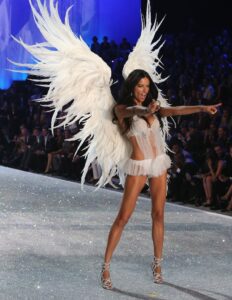There has been controversy surrounding the return of the Victoria’s Secret Fashion Show, which has faced criticism for its past representation of beauty standards and lack of diversity.
While the brand aims to revamp its image and embrace inclusivity, many voices in the fashion industry question whether it can truly shift from its historically narrow portrayal of women.
It’s comeback highlights discussions on body positivity and the evolving expectations of consumers regarding representation in fashion, making it clear that the brand’s efforts to reestablish itself are met with both interest and skepticism.

As the brand attempts to return to the runway, it faces scrutiny over whether it can genuinely transform its image and align with contemporary values. Critics argue that simply reintroducing the show is not enough; the brand must also demonstrate a commitment to authentic representation and inclusivity in its marketing and hiring practices.
This debate encapsulates larger conversations about the evolving landscape of fashion, consumer expectations, and the importance of reflecting a wider array of experiences and bodies in media.
The response to the brand’s attempts to change has been mixed, with some hopeful for a new direction while others remain skeptical, emphasizing that true progress requires more than just surface-level changes.

